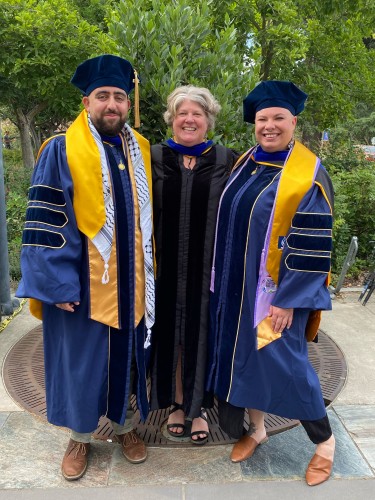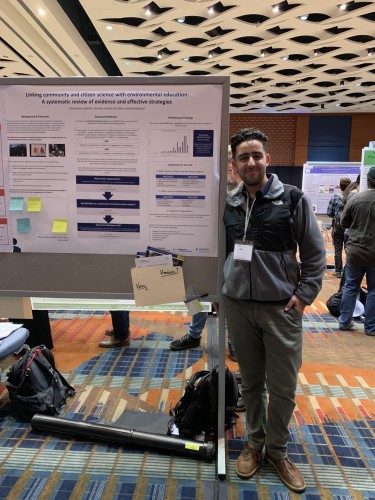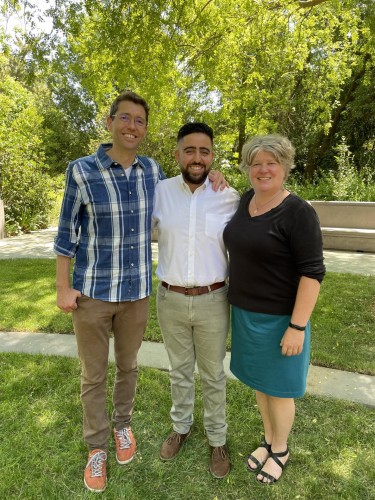It’s Farewell, for Now
This week we congratulate Chris Jadallah on receiving his doctorate degree! Officially graduated from the School of Education, Chris has worked with the Center as a graduate student since 2018.
 We’re so proud of all his work during his time with us.
Chris a brilliant scholar and compassionate educator,
pushing all of us to think and do better work for learners of all
backgrounds. He’s also a thoughtful friend, always connecting
colleagues with similar interests and bringing in treats to
share. While his presence will be sorely missed, we know
we’ll be seeing more from Chris and look forward to supporting
him in the next chapter. We asked Chris to reflect on his UC
Davis experience.
We’re so proud of all his work during his time with us.
Chris a brilliant scholar and compassionate educator,
pushing all of us to think and do better work for learners of all
backgrounds. He’s also a thoughtful friend, always connecting
colleagues with similar interests and bringing in treats to
share. While his presence will be sorely missed, we know
we’ll be seeing more from Chris and look forward to supporting
him in the next chapter. We asked Chris to reflect on his UC
Davis experience.
How did the Center help you grow professionally and personally?
The Center is home to a deeply thoughtful, kind, and supportive group of scholars and practitioners who are working at the cutting edge of community and citizen science (CCS). The mentorship and professional development opportunities I have received over the years have been invaluable in influencing my trajectory as an educational researcher doing community-engaged, interdisciplinary work. My colleagues have become my close friends who I am excited to continue building with in the years ahead.
In what ways have you grown over the last 5 years as a PhD student?
 As a researcher and educator, I’ve
developed new methodological abilities, sharpened my pedagogical
commitments, and grown more practiced in collaboration. I have
been fortunate to further develop many practical skills in areas
such as writing grants and managing projects, as well as the
interpersonal skills that are necessary to work across different
sets of groups. Curiosity, openness, criticality, and humility
have been central to this growth, all of which has come through
my time in both academic and community spaces.
As a researcher and educator, I’ve
developed new methodological abilities, sharpened my pedagogical
commitments, and grown more practiced in collaboration. I have
been fortunate to further develop many practical skills in areas
such as writing grants and managing projects, as well as the
interpersonal skills that are necessary to work across different
sets of groups. Curiosity, openness, criticality, and humility
have been central to this growth, all of which has come through
my time in both academic and community spaces.
How do you think the field of CCS has evolved over your time as a PhD student?
It has been heartening to see the field embrace issues of equity and justice in more robust ways. This is essential work should CCS live up to its aspirations of democratizing science, and ensuring that scientific institutions and practices become more oriented toward diverse communities’ needs and strengths. There is much more to be done in terms of confronting broader systems of power and undoing structural harms, but the work is happening and the future looks bright.
Do you have any advice for others currently in the field or interested in getting started?
 The field of CCS is highly dynamic
and draws on a wide range of research traditions and disciplines,
from large-scale ecological studies that leverage crowdsourcing
methodologies to participatory action research projects focused
on environmental justice. There is much to learn by reading
across these traditions and disciplines, and synthesizing where
appropriate. Also, people working in CCS tend to be warm and open
– don’t be afraid to reach out to those whose work inspires
you.
The field of CCS is highly dynamic
and draws on a wide range of research traditions and disciplines,
from large-scale ecological studies that leverage crowdsourcing
methodologies to participatory action research projects focused
on environmental justice. There is much to learn by reading
across these traditions and disciplines, and synthesizing where
appropriate. Also, people working in CCS tend to be warm and open
– don’t be afraid to reach out to those whose work inspires
you.
Where are you off to next? How can we stay connected?
I will be an Assistant Professor of Environmental Justice in Education at the School of Education & Information Studies at the University of California, Los Angeles. I’ll also remain connected to the Center as a faculty affiliate. Feel free to get in touch at cjadallah@ucla.edu.
We also wanted to give a special shoutout to School of Education graduate student Kait Murray, who finished her PhD! Kait worked with the Center on the CitSci on the Farm project and was a huge part of our community. Congratulations!








